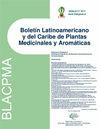芫荽精油。体外和硅片对登革病毒复制和细胞因子产生影响的评价
IF 0.7
4区 医学
Q4 INTEGRATIVE & COMPLEMENTARY MEDICINE
Boletin Latinoamericano y del Caribe de Plantas Medicinales y Aromaticas
Pub Date : 2023-11-30
DOI:10.37360/blacpma.23.22.6.57
引用次数: 0
摘要
由于缺乏有效的登革热常规疗法,人们对草药制剂作为替代疗法产生了兴趣。本研究考察了莪术精油(EO)对登革病毒复制和细胞因子产生的体外影响。用AutoDock Vina预测EO化合物与病毒和细胞蛋白之间的分子相互作用。在IC50< 30 μg/mL时,EO抑制登革热病毒血清型的复制,使lps刺激的PBMCs中TNF-α、IL-8和IFN-α分别降低87%、67%和46%。主要的EO化合物为反式-β-石竹烯(21.4%)、germacrene D(17.8%)、α-copaene(16.5%)、反式-β-愈木烯(8.2%)和α-蒎烯(6.0%)。前两种化合物δ-cadinene、α- murolene、α-cubebene和β-burbonene与TLR-4细胞因子效应通路相关的蛋白偶联。3,7-愈创二烯与病毒E和C蛋白偶联。本研究证明了C. curassavicaEO作为发现登革热新疗法的起点的潜力。本文章由计算机程序翻译,如有差异,请以英文原文为准。
Essential oil of Cordia curassavica(Jacq) Roem. & Schult: in vitroand in silicoevaluation of effects on dengue virus replication and cytokines production
The lack of effective conventional therapies against dengue has created an interest in herbal preparations as alternative therapies. In the present study, in vitroeffects of Cordia curassavicaessential oil (EO) on both dengue virus replication and cytokine production were examined. Predictions ofmolecular interactions between EO compounds and virus and cell proteins were performed with AutoDock Vina. The EO inhibited replication of dengue virus serotypes at IC50< 30 μg/mL, and it reduced 87% TNF-α, 67% IL-8 and 46% IFN-α in LPS-stimulated PBMCs.The main EO compounds were trans-β-caryophyllene (21.4%), germacrene D (17.8%), α-copaene (16.5%), trans-β-guaiene (8.2%), and α-pinene (6.0%). The first two compounds, δ-cadinene, α-muurolene, α-cubebene and β-burbonene were coupled to proteins involved in the TLR-4 cytokine effector pathway. 3,7-Guaiadiene was coupled to the viral E and C proteins. This study demonstrates the potential of C. curassavicaEO as a starting point for discovering novel therapeutic for dengue.
求助全文
通过发布文献求助,成功后即可免费获取论文全文。
去求助
来源期刊

Boletin Latinoamericano y del Caribe de Plantas Medicinales y Aromaticas
PHARMACOLOGY & PHARMACY-
CiteScore
1.30
自引率
14.30%
发文量
49
审稿时长
6-12 weeks
期刊介绍:
The Boletín Latinoamericano y del Caribe de Plantas Medicinales y Aromáticas (BLACPMA), [Latin American and Caribbean Bulletin of Medicinal and Aromatic Plants]; currently edited by the publishing house MS-Editions, is a bi-monthly international publication that publishes original peerreviewed research in the field of medicinal and aromatic plants, with nearly 20 years of experience. BLACPMA is a scientific journal that publishes two types of articles: Reviews (only in English) and Original Articles (Spanish or English), its main lines of action being agronomy, anthropology and ethnobotany, industrial applications, botany, quality and standardization, ecology and biodiversity, pharmacology, phytochemistry, pharmacognosy, regulatory and legislative aspects. While all areas of medicinal plants are welcome and the experimental approaches used can be broad and interdisciplinary; other areas of research that are not mentioned depend on the Editorial Committee for their acceptance.
 求助内容:
求助内容: 应助结果提醒方式:
应助结果提醒方式:


